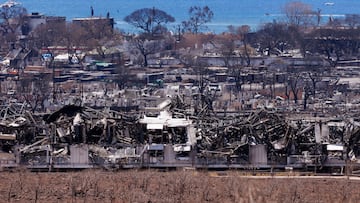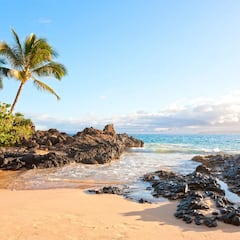Tourism in Hawaii: Why the locals don’t want tourists to come back
After wildfires destroyed many towns on the island of Maui people are asking what comes after the rebuilding.


At least 111 have been confirmed dead in the wildfires which ripped through Hawaii last week. While thousands were being evacuated from the devastated villages, airlines kept ferrying tourists into the island.
“The same waters that our people just died in three days ago are the same waters the very next day these visitors - tourists - were swimming in,” a local told the BBC.
Local officials have made calls to stay away but do not have the political power to prevent tourists from visiting the islands. There have also been reports that property developers have been contacting residents to buy up the charred land which once held their home.
The governor of Hawaii is asking tourists to avoid traveling to the parts of Maui that were devastated by wildfires. He says about 1,300 people are still missing in Lahaina with nearly 80 percent of the historic town searched. pic.twitter.com/x6UTiLBIrm
— CBS Evening News (@CBSEveningNews) August 20, 2023
It is not the first time local residents have been at loggerheads with tourists.
To deal with droughts in 2021 residents were levied $500 fines for non-essential water use. Hotels and resorts could continue to keep their pools flowing and golf courses water however.
"People lost everything."
— DW News (@dwnews) August 11, 2023
While tourists scrambled for flights out of Hawaii to escape the raging wildfires, many Lahaina residents stayed behind — only to find out later that their homes had turned to ashes. pic.twitter.com/hwx31MfjxW
In the distinct Hawaiian culture, borne from its history as a Polynesian kingdom, the land, or “aina,” is considered sacred. More and more tourists means more and more developments, bulldozing ancient traditions.
While some residents are calling for tourists to stay away, the nature of the Hawaiian, particularly Mauian, economy means it isn’t that simple.
Tourism and the Hawaiian economy
It is a difficult quandary for the government of Hawaii to sort due to the reliance of tourism in the islands’ economy. The islands draw millions of tourists each year. State government data pointed to 9.4 million visitors in 2017 alone, a huge number for islands of just 1.4 million people.
Related stories
The business surrounding these visitors constitute a quarter of all the money made in 2019, putting it in the top 10 places in the world for its dependence on tourism. Maui is even more reliant, 80 percent. Simply turning these people away is not an option for a state with a poverty rate of 15 percent.
Diversifying the economy is an option but that is not a quick fix. More sustainable coexistence will be needed.

